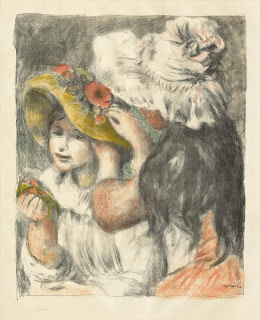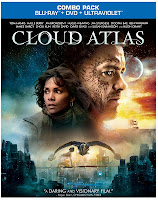- Details
-
Parent Category: Film and the Arts
-
Category: Reviews
-
Published on Monday, 27 May 2013 03:49
-
Written by Kevin Filipski
Blu-rays of the Week
 America’s National Parks: An Eagle’s View
America’s National Parks: An Eagle’s View
(Mill Creek)
This “greatest hits” program of gorgeously shot segments from several America’s National Parks specials runs from coast to coast: beginning at Maine’s Acadia and ending where it all began, our first national park, Yellowstone.
In between, there are glorious looks at the natural glories of the Great Smoky Mountains, Everglades, Badlands, Glacier, Yosemite and Death Valley. This satisfying Blu-ray transfer makes this a valuable souvenir for those who have (or haven’t yet) visited any of these parks.
Band of Outsiders
Fifty years on, Jean-Luc Godard’s 1964 gangster spoof comes off as a lazy exercise in self-aggrandizing, with literary and movie “quotes” showing off his erudition. There’s also Anna Karina—Godard’s first muse—whose charm is somehow lost on me; in compensation, there’s great freedom of movement and splendid cinematography by the great Raoul Coutard (whose first film, the shattering Vietnam drama Hoa Binh, would make a terrific Criterion Collection addition).
The Blu-ray image looks immaculate; extras include a vintage interviews with Godard and ones from 2002 with Karina and Coutard, along with an Agnes Varda short featuring then-lovers Godard and Karina.
The Bletchley Circle
(PBS)
A group of women who worked together during WWII in top-secret code-breaking jobs reunite years later to solve a series of murders baffling the police in this tautly enjoyable thriller.
The quartet of actresses—Anna Maxwell Martin, Rachael Stirling, Sophie Rundle, Julie Graham—is an accomplished team that butts heads with the old boys’ networks in their lives, both at home and at the police station. Such a well-made, straightforward crime drama is fun to watch. On Blu-ray, it looks superb; extras include cast and crew interviews.
The Sinful Nuns of St. Valentine
(Redemption/Kino)
A pair of cheesy early 70s horror films get the hi-def treatment. Cold Eyes of Fear, directed by Enzo G. Castellari (the original Inglorious Bastards), opens startlingly with a sexual assault—or does it? Then it turns into a solid thriller about a home invasion and kidnaping.
Sergio Grieco’s Sinful Nuns, which is obviously indebted to Ken Russell’s outlandish The Devils, has nudity and lesbianism aplenty, likely to keep many viewers watching. The Blu-ray transfers are good and grainy enough.
(Slought Foundation)
The Occupy Wall Street movement was ridiculed by right-wingers as being run by fear-mongering elitists who targeted defenseless bankers. But this fascinating documentary about a multi-locale staging of Brecht’s play The Days of the Commune—in 1871 Paris, the working class rose up against the government—shows that OWS was also daring and fluid political theater.
On Manhattan locales from Zuccotti Park (where the Occupy movement began) to Lincoln Center and Central Park, several mainly amateur performers act out Brecht’s clarion call of words and music. It’s a pretty wooden drama, but as living history, it’s memorable. And it looks good on Blu-ray.
(e one)
Told in a fleet 80 minutes, this tale of an orphaned 19-year-old being tracked down by a roving band of murderers who murdered her family is excitingly done.
Set in 1363 after the Black Death, the movie gains much from being gorgeously shot on stupendous Scandinavian landscapes, and for cleverly pacing its action. The Blu-ray transfer is excellent; extras include bloopers, deleted scenes and a visual effects overview.
(Lionsgate)
Why did Arnold Schwarzenegger pick this rote shoot ‘em up for his big screen return (following 2003’s Terminator 3)? Probably because of Korean director Kim Jee-Woon, whose explosive set pieces are indeed impressive.
But they’re silly too—the big car chase that pits Midwestern sheriff Arnie and the bad guy who escaped the inept feds in a corn field is ridiculous. Still, the explosions and bad one-liners might be enough for undiscriminating fans. The Blu-ray looks fine; extras are featurettes and interviews.
(RLJ Entertainment)
Watching Steven Dorff again as a brooding loner, I feel like I’ve seen this movie a dozen times before. Here, he plays a just-released con who gets mixed up with another deadly crime and ends up with a beautiful young woman whom he improbably meets on a local bus.
Dorff shows off his pecs and tats again, Michelle Monaghan acts up a storm as his new paramour, and Willem Dafoe is as creepy a villain as usual—but the movie is bland and ordinary. The Blu-ray transfer is very good.
Blood of the Vine—Seasons 1 & 2
(MHZ Networks)
Only the French could dream up such a TV detective program: a wine expert becomes a sleuth after the police call him in to help solve a series of vine-related murders.
Although the plotting is pedestrian, the novelty of a wine expert figuring out how vineyards and vintages figure in killings is delicious, and of course Pierre Arditi—veteran of many Alain Resnais films—is perfect as our hero. The two volumes comprise eight 90-minute stories which are dramatically padded but feature the glories of French wine country.
(Warner Archive)
Howard Hawks’s campily entertaining 1955 sandals-and-swords epic about an Egyptian ruler who has slaves build a pyramid for him, which will also serve as his tomb, works despite its essential cheesiness.
Although shot in Panavision with vibrant color shades, the most amazing-looking visuals are Joan Collins (queen) and Luisa Boni (slave). The lone extra is a Peter Bogdanovich commentary.
Laure/Vanessa/Felicity: Naughty! Naughty! Naughty!
(Severin)
This boxed set comprises a trio of late ‘70s soft-core “classics” which all deal with a familiar plot of innocence debauched.
Despite exotic locations—Laure takes place in tropical Manila, Vanessa and Felicity in Hong Kong—the movies are interchangeable; still, the naked charms of their leading ladies are certainly worthy of comment. Extras include a commentary on Felicity, behind-the-scenes interviews on Vanessa and Laure.
Queen on Fire—Live at the Bowl
(Eagle Vision)
Queen’s 1982 funk-disco hybrid album Hot Space was below par—especially after the worldwide smash album The Game—but the live show was, as always, incendiary (I saw them in Toronto that summer for the third and final time with Freddie Mercury).
This two-disc set shows off Queen at its hard-rocking best, 90 minutes of pure rock’n’roll. Combining Hot Space tunes with older favorites and classic singles, this is another major Queen concert event. The bonus disc includes additional performances and interviews.
(BBC Home Entertainment)
D.H. Lawrence’s novels Women in Love and The Rainbow—both turned into movies by Ken Russell in 1969 and 1989, respectively—have been morphed into a two-part, three-hour BBC film that revels in the explicitness that shocked Lawrence’s readers when the books came out nearly a century ago.
Although fusing the books adds unnecessary strain to the plotting and characters, it’s been so elegantly directed by Miranda Bowen and so skillfully acted by Rosamund Pike, Rachel Stirling, Saskia Reeves, Rory Kinnear and Ben Daniels, it approximates the emotional depth of Lawrence’s classic works.
CD of the Week
Duke Ellington—Black, Brown and Beige
(Naxos)
The Buffalo Philharmonic Orchestra—which just played a triumphant Carnegie Hall concert—has, under music director JoAnn Falletta, become a big-league ensemble that can even swing, as this enjoyable disc of big-band works by Duke Ellington shows.
From the free-wheeling opener, Harlem, to a snazzy arrangement of Take the A Train, the orchestra, Falletta and guest soloists Sal Andolina (sax), Amy Licata (violin) and Tony DiLorenzo (trumpet)—also blast through the Black, Brown and Beige and The River suites and Ellington’s unfinished ballet Three Black Kings.








































